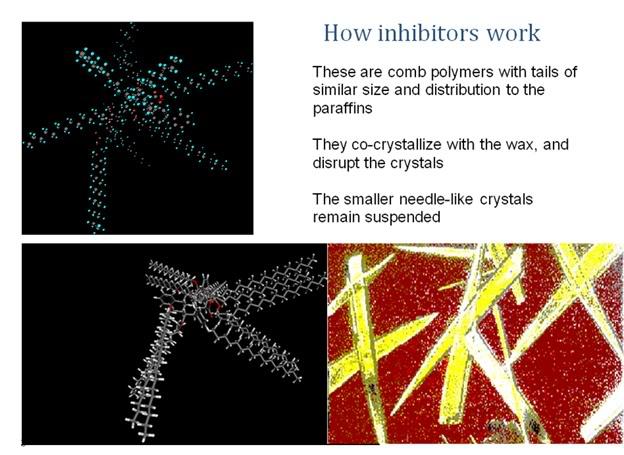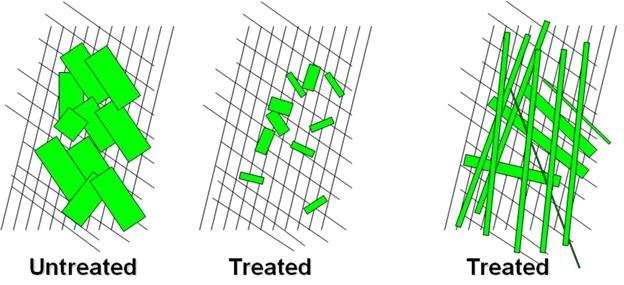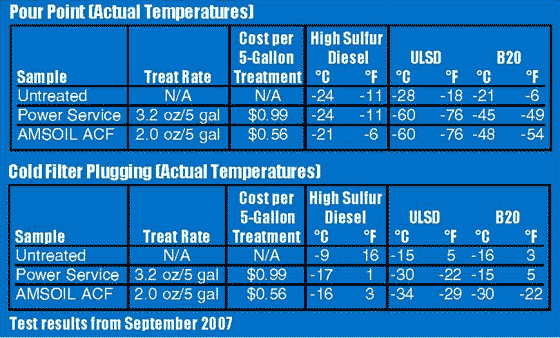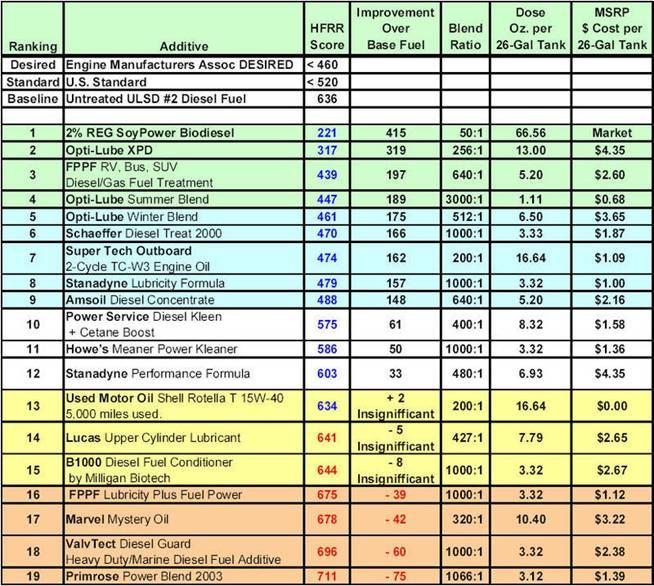Diesel Fuel Anti-Gel Explained
By: Chuck @ Duluth Diesel
http://www.twinportsales.com
All diesel fuel inherently has water in it. That is why your truck has a fuel/water separator built into the fuel filter assembly that you periodically have to drain.
Two things happen to diesel fuel in the cold.
- The paraffin (petroleum wax) component of the diesel fuel will polymer together, forming a wax layer in your fuel. This is called gelling. Once the paraffin wax forms, it is very hard to reintegrate back into the fuel. This wax will clog your lift pump and fuel filter, leaving you dead on the side of the road.
- The water component in the fuel, which is impossible to avoid with diesel fuel in most cases, will turn into ice. Since fuel and water do not mix, the water component will separate out in your tank. As this turns into ice, the ice crystals stack up on the the filter face, causing filter icing. This will also prevent fuel flow and starve your engine of fuel.
So, any wise diesel owner should do three things in the winter:
1. Always carry a spare fuel filter in your truck for roadside emergency use.
2. Run an anti-gel diesel fuel additive that prevent paraffin wax polymerization, but also has a deicer that prevents ice crystal buildup.
3. Keep 1 bottle of fuel reintegration emergency additive in the truck. This is smart to have in case you do have a gel or ice issue, it can reintegrate the fuel.
Ensuring that you run an anti-gel in the winter will keep you on the road by preventing gelling and icing.
Anti-gel explained:
Wax forms plate like structures (flat) and AMSOIL Cold Flow breaks those up, more like strings, so fuel can flow through. It modifies the wax crystals to allow the fuel to pass through filters, and prevent premature plugging due to gel. It also works well with biodiesel blends as well. Biodiesel has horrible cold temperature properties in general, and the use of a biodiesel-compatible product will help lower the point at which the fuel clouds, or begins to gel. Biodiesel or B100 does not contain paraffin since it is not petroleum based. When B100 gets cold crystals do appear and they act like wax in that they stick together and are large enough to plug filters. These crystals form sooner or at higher temperatures and are larger in size in B100 than in regular diesel fuel. Biodiesel is defined as mono-alkyl esters of long chain fatty acids derived from vegetable oils or animal fats which conform to ASTM D6751 specifications for use in diesel engines. The saturated compounds in the Biodiesel form the crystals that plug filters. When they form they are larger than diesel wax crystals. Most anti-gels, including AMSOIL, work best on biodiesel fuels of B20 and less.
The key to messing with paraffin wax gel is to disrupt it from agglomerating together into a “glob” that is big enough to plug a filter and or fuel line. A copolymer chemical (with molecular chains similar in size and distribution to paraffin) co-crystalize with the waxes and disrupt the crystal formation, thereby allowing your fuel to continue to flow through your fuel filter and keep you on the road.
As diesel fuel cools you will notice a white haze or cloud in the fuel. This usually happens around +10 degrees F. but can happen at higher or lower temperatures depending on fuel characteristics. The white cloud or haze is caused by wax crystals precipitating (coming out of solution) out of the fuel and becomes visible. When fuel warms above the Cloud Point of the fuel, the white appearance will disappear as wax crystals dissolve back into the fuel. The use of an anti-gel usually does not change the Cloud Point of a fuel, and if it does it is usually only by a few degrees. There are however some Cloud Point depressants that can significantly reduce the Cloud Point of a fuel. Cloud Point depressants will adversely affect anti-gels or Pour Point Depressants, however. Anti-gels typically affect the CFPP (cold filter plugging point) and Pour Points of a fuel. Anti-gels work on the wax crystals in the fuel. As the wax crystals form or come out of solution, the anti-gel will modify the wax crystals so they are smaller, will not stick together and will continue to flow through the filter in much lower temperatures than untreated fuel.



ULTRA-LOW-SULFUR DIESEL FUEL CHALLENGES
Reduced sulfur levels in modern ultra-low-sulfur diesel fuel (ULSD) result in reduced lubricity, the property that controls wear in the fuel injectors and fuel pump. Improving lubricity in ULSD is difficult because it must be done without adding sulfur back into the fuel. Additionally, ULSD is subjected to extensive refining, making it even more difficult to treat. For these reasons, many competitive claims are not based on ULSD fuels, rendering them inaccurate and irrelevant. AMSOIL Diesel Concentrate Plus Cold Flow Improver is formulated specifically for modern ULSD fuel. It improves lubricity, helps maintain engine oil TBN and prevents soot loading.
SUPERIOR COLD-WEATHER PERFORMANCE
As the temperature drops, the wax naturally found in diesel fuel begins to form crystals. The point at which wax crystals form is known as the cloud point. These wax crystals eventually clog the fuel filter and starve the engine of fuel, preventing it from starting. While low quality fuels may form wax crystals in temperatures as warm as 40°F (4°C), most fuels have a cloud point near 32°F (0°C). The point at which the wax crystals clog the fuel filter is known as the cold filter-plugging point (CFPP). AMSOIL Diesel Concentrate Plus Cold Flow Improver lowers the CFPP by as much as 34°F (19°C) in ULSD.
It also reduces the pour-point temperature of treated diesel fuel, providing better fuel delivery to the injectors during cold weather. It is formulated with a jet-fuel-type deicer that disperses water to control ice formation in all sections of the fuel system. Diesel Concentrate Plus Cold Flow Improver minimizes the need for the use of #1 diesel fuel, enabling better fuel economy, performance and lubricity.
POUR POINT VS. CFPP
It is important to distinguish between CFPP and pour point. Many competitors make great claims regarding pour point, leading consumers to believe their products are superior when they actually have an inferior CFPP. Once fuel surpasses its cloud point, the wax crystals begin to clog the fuel filter. The CFPP temperature is a more important characteristic than pour point because the engine will not run if fuel cannot pass through the fuel filter.
AMSOIL's summer diesel additive is AMSOIL Diesel Concentrate.
Cetane lowers the flash point of diesel fuel. It doesn't really add any energy or Btu content to the fuel. In the winter, cetane is advantageous since it makes diesel fuel easier to ignite at lower temperatures. This also improves combustion, which is good for minimizing incomplete ignition/combustion that results in cylinder wash down. Cylinder wash down in a diesel means that the unburned (incompletely combusted) diesel fuel washes down the cylinder walls, causing piston ring lubricity to suffer, which can lead to cylinder wall scoring and ring deterioration. It also leads to oil dilution (fuel contaminating oil) which deteriorates the oil's TBN (total base number) and lubricating properties.
Getting back to Cetane, since it lowers flashpoint, is an additive that is overused and misunderstood. In warmer months, especially when towing where cylinder temps and exhaust gas temperatures can be between 1,100 and 1,400 degrees Fahrenheit sustained, cetane can do a disservice. Lowering the flashpoint of diesel fuel in these high temperature situations can cause preignition (fuel combustion before the piston reaches top dead center, or TDC). This can cause a drop in power, a drop in mileage, and excess piston face stress. In an extreme case, usually in modified engines, this can promote piston failure, which inevitably leads to engine failure. I know Cetane is advertised as a power enhancer, and people tend to over treat with it quite a bit in my experience. For this reason, AMSOIL's Diesel Concentrate does not include a Cetane Booster additive. AMSOIL offers a separate product, AMSOIL Cetane Boost, as a stand alone cetane additive. This leaves the end user the option of adding or not adding cetane to their fuel depending on ambient temperature, engine demands and operating temperature, and fuel quality.
Running Power Service with Cetane Boost will not cause your engine to fail. My example above is an extreme case, in a modified diesel engine with gross over treatment. But, if you're paying money for a cetane boost that is causing you to see a drop in rear wheel horsepower and a drop in mileage, wouldn't you like the option to omit cetane additives during the warmer months?
AMSOIL Diesel Concentrate and AMSOIL Diesel Concentrate with Cold Flow are some of the better additives on the market when it comes to lubricity.
Running 2 stroke is the best thing for the HFRR (lubricity) rating in fuel, but 2 stroke oil doesn't give you fuel detergency, stability, anti-gel qualities, etc. In my 2002 Dodge Cummins, I run AMSOIL Diesel Concentrate (and Diesel Concentrate with Cold Flow in the winter) and I add inAMSOIL Interceptor 2 stroke oil for added lubricity. I do this because 1998.5 - 2002 Dodge Cummins trucks have the Bosch VP44 injection pump that is especially sensitive to fuel HFFR ratings for injector pump survival.
The lower the HFRR number, the better your lubricity. This chart was taken from mopar1973man.com (Michael Nelson). Michael is a guy who is a big proponent of 2 stroke oil in diesel fuel as a lubricity improver. I've had many good conversations with Mr. Nelson and agree with him on most points. I contend that while 2 stroke oil DOES add lubricity, it doesn't do much for gel point, and it does nothing for detergency. Keeping your fuel system and injector nozzles clean is important to mileage, power, and to keep from scorching pistons. That's why I run AMSOIL Diesel Concentrate as well as AMSOIL Interceptor 2 stroke oil. I get fuel stability, anti-gel, detergency, and ultimate lubricity. I've been running this combination of additives for years now with perfect results.
Running 2 stroke in diesel fuel is against all manufacturer recommendations. No manufacturer will tell you to run 2 stroke oil in diesel fuel, since that use is inconsistent with the labeling and intended purpose of 2 stroke oil. But the facts on HFRR speak for themselves. Also, I don't recommend running 2 stroke oil in any diesel engine that is designed to run ULSD fuel. Lubricity is mostly a concern for diesels that were designed to run on LSD and HSD fuels and that can be damaged by the commonly poor lubricity ratings of ULSD fuels.



There are no reviews to display.